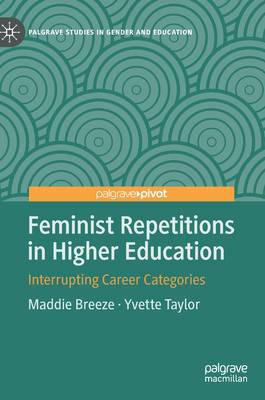
Door een staking bij bpost kan je online bestelling op dit moment iets langer onderweg zijn dan voorzien. Dringend iets nodig? Onze winkels ontvangen jou met open armen!
- Afhalen na 1 uur in een winkel met voorraad
- Gratis thuislevering in België vanaf € 30
- Ruim aanbod met 7 miljoen producten
Door een staking bij bpost kan je online bestelling op dit moment iets langer onderweg zijn dan voorzien. Dringend iets nodig? Onze winkels ontvangen jou met open armen!
- Afhalen na 1 uur in een winkel met voorraad
- Gratis thuislevering in België vanaf € 30
- Ruim aanbod met 7 miljoen producten
Zoeken
Feminist Repetitions in Higher Education
Interrupting Career Categories
Maddie Breeze, Yvette Taylor
€ 52,95
+ 105 punten
Uitvoering
Omschrijving
To do feminism and to be a feminist in higher education is to repeat oneself: to insist on gender equality as more than institutional incorporation and diversity auditing, to insert oneself into and against neoliberal measures, and to argue for nuanced intersectional feminist analysis and action. This book returns to established feminist strategies for taking up academic space, re-thinking how feminists inhabit the university and pushing back against institutional failures. The authors assert the academic career course as fundamental to understanding how feminist educational journeys, collaborations and cares and ways of knowing stretch across and reconstitute academic hierarchies, collectivising and politicising feminist career successes and failures. By prioritising interruptions, the book navigates through feminist methods of researcher reflexivity, autoethnography and collective biography: in doing so, moving from feminist identity to feminist practice and repeating the potential of queer feminist interruptions to the university and ourselves.
Specificaties
Betrokkenen
- Auteur(s):
- Uitgeverij:
Inhoud
- Aantal bladzijden:
- 129
- Taal:
- Engels
- Reeks:
Eigenschappen
- Productcode (EAN):
- 9783030536602
- Verschijningsdatum:
- 1/10/2020
- Uitvoering:
- Hardcover
- Formaat:
- Genaaid
- Afmetingen:
- 148 mm x 210 mm
- Gewicht:
- 349 g

Alleen bij Standaard Boekhandel
+ 105 punten op je klantenkaart van Standaard Boekhandel
Beoordelingen
We publiceren alleen reviews die voldoen aan de voorwaarden voor reviews. Bekijk onze voorwaarden voor reviews.











